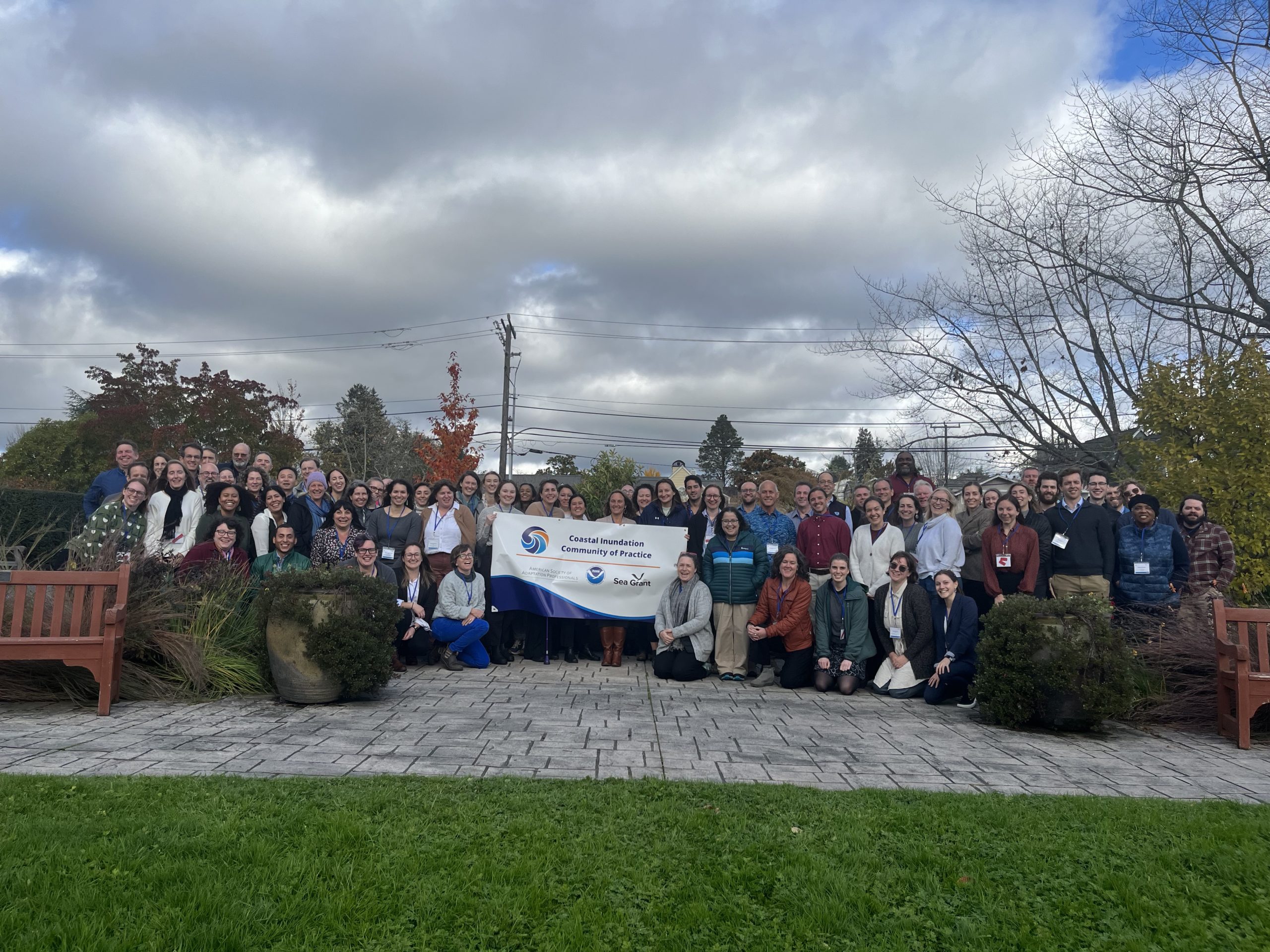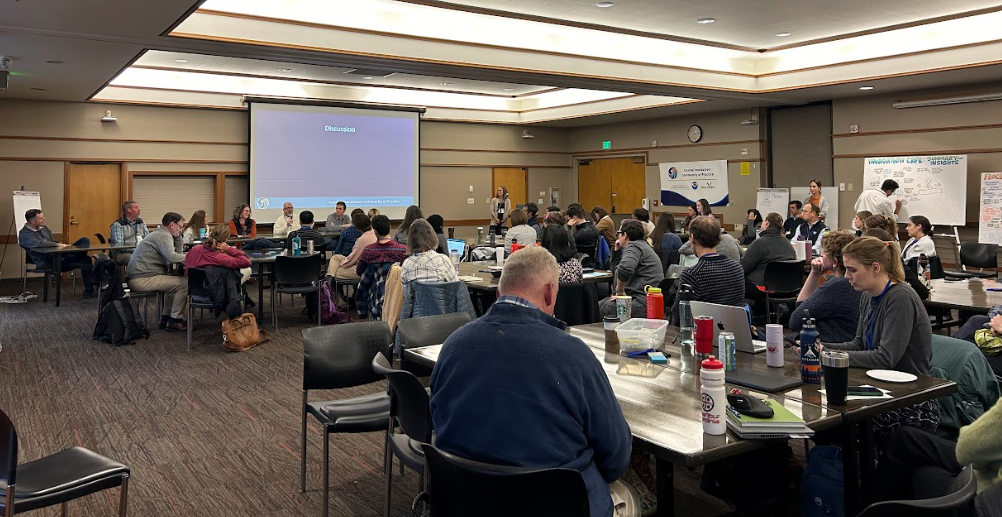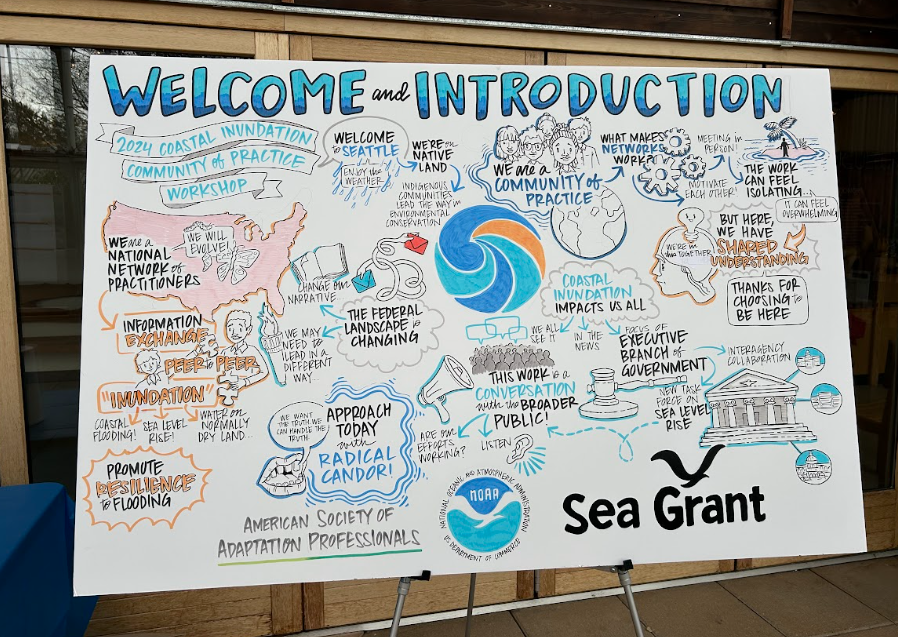The Coastal Inundation Community of Practice is a national network of practitioners that facilitates peer-to-peer learning, information exchange, and collaborative engagement to advance coastal flooding science, knowledge and solutions.
Coastal inundation - water on normally dry ground as a result of flooding - is a complex problem that requires a multidisciplinary, long-term, coordinated effort to address. The impact of coastal inundation can be devastating, leading to property damage, displacement of populations, and loss of life. Collaboration across the public, private, non-profit, and academic sectors ensures that the best available knowledge and expertise are being utilized to address inundation in coastal communities. NOAA's Office for Coastal Management (OCM), the National Sea Grant Office (NSGO), and the American Society of Adaptation Professionals (ASAP) are collaboratively building and facilitating the Coastal Inundation Community of Practice to advance resilience to flooding now and in the future.
Upcoming Events
Webinar Series: NOAA Atlas 15
Date: October 30, 2025
Time: 2:00 P.M. - 3:00 P.M. ET / 11:00 A.M. - 12:00 P.M. PT
Join us for a webinar exploring NOAA Atlas 15, the newly released, authoritative, and spatially continuous National Precipitation Frequency Atlas of the United States.
As the U.S. experiences more intense rainfall, frequent flooding, and prolonged droughts, it’s crucial that practitioners are equipped with the precipitation information they need to make the country’s water resources and infrastructure more resilient to changes in rainfall patterns.
This session will cover:
- Key updates and improvements in NOAA Atlas 15 compared to Atlas 14
- Demonstration of the new web interface
- Applications for water quality, flood risk, and infrastructure design
- Insights into how this dataset addresses user needs
Coffee Chat: The Sea is Rising: A Multi-Level Analysis of Sea Level Rise Policy Perspectives in Hawaiʻi
Date: November 6, 2025
Time: 2:00 P.M. - 3:00 P.M. ET / 11:00 A.M. - 12:00 P.M. PT
The State of Hawaiʻi presents a “most likely” case study for the advancement of sea level rise (SLR) policy because of its high vulnerability as a remote island state, deep blue politics, high public awareness of climate change, a strong public trust law, and because of historical and cultural ties to living near water. And yet, the advancement of SLR- related policy in Hawaiʻi, like elsewhere in the U.S., is moving slowly. What accounts for the lack of policy progress?
Dr. Ketty Loeb from the University of Hawaiʻi at Mānoaʻs Institute for Sustainability & Resilience will share findings from surveys of elected officials, agency staff and residents in Hawaiʻ conducted between 2023 and 2025. The surveys seek to better understand how respondents view the risks of sea level rise and how they are prioritizing policy response.
The session will highlight new survey tools which may be of use to other states as well as an original dataset that will be used to better understand the opportunities and challenges surrounding the advancement of SLR policy.
2026 Coastal Inundation Community of Practice Workshop
Stay tuned for the 2026 Workshop details!
View presenter slides and other multimedia from the 2024 Coastal Inundation Community of Practice Workshop in Seattle, WA.
Resources
This document synthesizes insights from group discussions on fostering effective inundation Communities of Practices from the Coastal Inundation Community of Practice Workshop on 11/13/2024 with ~90 coastal flooding practitioners. The conversation focused on four key themes or “ingredients” critical to CoP success: Audience and Purpose, Coordination and Sustained Leadership, Equitable Participation and Knowledge Sharing, and Trust and Relationship Building.
› Download the Ingredients for a Successful Community of Practice
Newsletter Archive
Past Events
The Coastal Inundation Community of Practice launched a webinar series, designed to help you make the most of the quick views in NOAA's Sea Level Calculator.
Each session focused on one of the quick views and offered:
- Guided demonstration
- Hands-on scenarios
- Interactive polls
- Opportunities to ask the developers your questions
Webinar # 1: Observed Sea Level Trends and Future Sea Levels Quick Views
August 20, 2025
Examined historical sea level trends with tide gauge and satellite data, and explored regional extrapolations to project future conditions.
Future Sea Levels Quick View
Explore how to customize thresholds and datums, visualize inundation scenarios, and compare observation-based trajectories with model-based projections.
Webinar # 2: Seasonal Variation Quick View
September 3, 2025
Use monthly flooding and extreme events data to anticipate risk periods and plan for infrastructure maintenance, road closings, and public safety measures.
Webinar #3: Changes in Flood Frequency Quick View
September 17, 2025
Participants learned how to combine historical flooding data with future projections to illustrate how minor, moderate, and major flood events will evolve under various sea level rise scenarios. Customize flood day thresholds, and visualize how these compare to projected conditions.
Missed a session? You can watch the recording of the deep dives here.
This interactive session introduced attendees to the mission and work of NOAA’s Disaster Preparedness Program. This program supports preparedness, response and recovery efforts across NOAA and with federal, state, and local partners through trainings, exercises and coordination activities. Attendees learned how the program strengthens resilience to disasters and coastal hazards, and heard firsthand how it supports each region.
CORA pairs historical observations from NOAA tide gauges with modern computer models to fill gaps in historical records. The dataset helps create a more complete and consistent picture of historical water levels by modeling waves and water levels between NOAA tide gauges. This reanalysis for the Gulf, Atlantic, and Caribbean is made possible through observations from National Water Level Observation Network (NWLON). This celebrated, novel approach of combining models and observations can be used to better assess long-term sea level change and compare current flood risks to those of the past, especially in areas where such data is currently unavailable.
Speaker:
- Analise Keeney (Coastal Hazards Oceanographer with NOAA’s Center for Operational Products and Services, CO-OPS)
In this webinar, the panelist discussed the value of regional networks and highlighted strategies that have been successful within their regions for building effective networks for coastal resilience.
Speakers:
- Lydia Salus (Wisconsin Coastal Management Program) – Collaborative Action for Lake Michigan Coastal Resilience (CALM),
- Tracie Sempier (Mississippi-Alabama Sea Grant Consortium) – Gulf Resilience Community of Practice, and
- Danielle Swallow (Delaware Sea Grant) – Delaware Resilient And Sustainable Communities League (RASCL).
Special improvement districts are a proven tool used across the country to establish public-private partnerships and tackle complex resilience challenges. The Waikīkī Beach Special Improvement District was created in 2015 to preserve and restore Waikīkī Beach. Commercial properties in Waikīkī are assessed a Beach Special Improvement tax based on their property value. Learn how the Waikīkī Beach Special Improvement District has successfully funded resilience initiatives over the past decade —and consider how this model might apply in your community.
Speaker: Dolan Eversole (Waikīkī Beach management coordinator through Hawai'i Sea Grant)
This webinar highlighted the CEAR Hub's collaborative work with the Pin Point Betterment Association to address critical challenges facing the historic Gullah Geechee community of Pin Point, GA. Speakers discussed how community-driven strategies are building Pin Point’s resilience against flooding, aging infrastructure, and coastal development while also preserving their rich cultural heritage.
Speakers: Kait Morano (CEAR Hub), and Jasmine Smith (Pin Point Betterment Association)
NOAA's Office for Coastal Management (OCM), the National Sea Grant Office (NSGO), and the American Society of Adaptation Professionals (ASAP) hosted the 2024 Coastal Inundation Community of Practice Workshop on November 12-14, 2024, at the University of Washington Center for Urban Horticulture in Seattle, Washington. This workshop brought together 100 coastal flooding practitioners representing diverse transdisciplinary perspectives. This in-person workshop provided a unique opportunity to build relationships among practitioners from across the country. Coastal communities faced tremendous inundation threats, and local practitioners addressed these challenges with innovative solutions that transformed coastal ecosystems, built environments, and socioeconomic structures.
Stay tuned for the 2026 Workshop details!
This interactive discussion explored strategies for advancing flood resilience in rural coastal communities. Participants engaged with peers in small groups to discuss common challenges and share transferable strategies related to communication and engagement, capacity and partnerships, environmental justice policies, and funding opportunities.
Speaker: Renee Collini (The Water Institute)
During this webinar, participants discussed common terminology and heard case studies from Maine, California, and Hawaiʻi. Speakers focused on the vulnerability assessment planning process and execution, stakeholder engagement, and high-level results from their efforts.
Resources:
- Vulnerability Assessment webinar recording and slides
- Vulnerability Assessment Resource Guide – an inventory of tools and resources that can be helpful when creating coastal flooding vulnerability assessments
- Participant agenda and speaker bios
Speakers: Jessica Brunacini (Wells National Estuarine Research Reserve), Julia Chase (City of San Diego), Ruby Pap (Hawaiʻi Sea Grant), and Jake Thickman (NOAA Office for Coastal Management)
This event launched the Coastal Inundation Community of Practice by creating a collaborative space for participants to connect, listen, share, support, and learn from others on coastal flood risk management challenges. Participants were introduced to the Coastal Inundation Community of Practice, provided input on future activities, and networked with peers. During a panel discussion, speakers shared coastal inundation challenges they face and their perspectives on how the community of practice will be of value in addressing them.
Resources:
- FAQ document
- Virtual Kick-off recording
Speakers: Heidi Stiller (NOAA Office for Coastal Management), Doug Marcy (NOAA Office for Coastal Management), Gwen Shaughnessy (NOAA Center for Operational Oceanographic Products and Services), Lisa Auermuller (Rutgers – Department of Marine and Coastal Sciences (MACH)), Priscilla De La Cruz (City of Providence)
Ways to Get Involved
Implementation Team
Thank you to the Implementation Team for helping guide the Coastal Inundation Community of Practice! Meet the team:
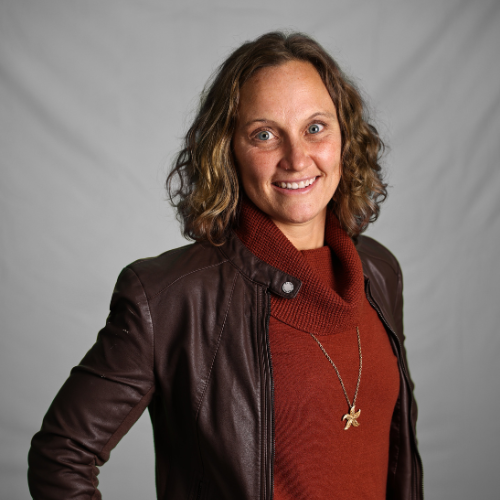
Lisa Auermuller
Associate Director, Rutgers – Department of Marine and Coastal Sciences (MACH)

Vidya Balasubramanyam
Program Director, Coastal States Organization
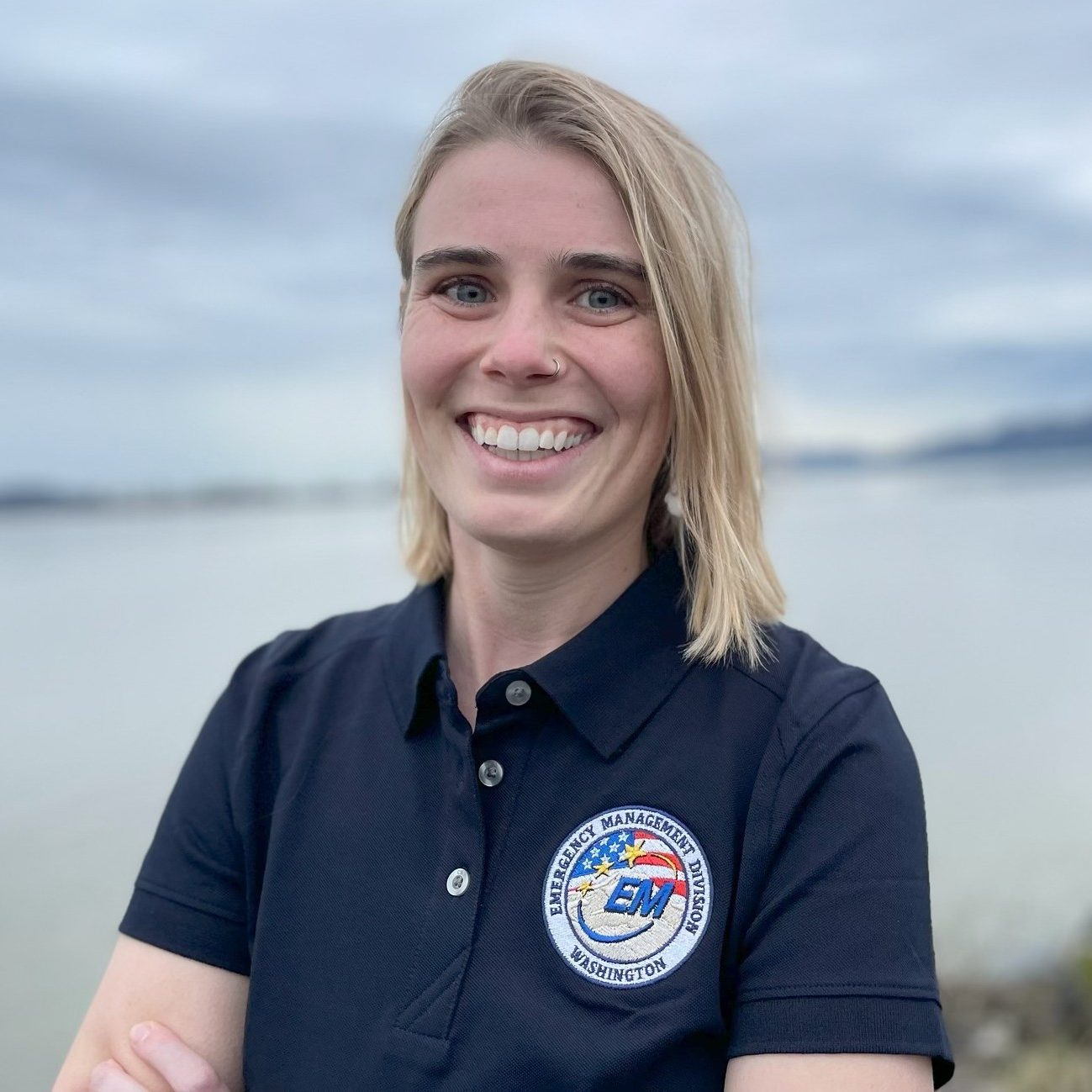
Ellen Chappelka
Coastal Resilience Specialist, Washington State Emergency Management
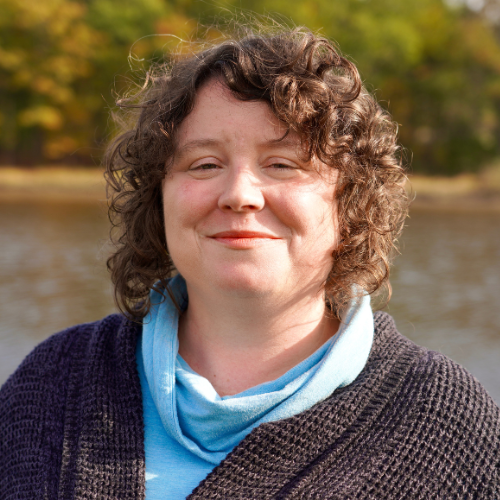
Annie Cox
Watershed Resilience Manager, Piscataqua Region Estuaries Partnership

Jake Kolanowski
Coastal Resilience Coordinator, Wisconsin Coastal Management Program

Jen West
Coastal Training Program Coordinator, Narragansett Bay Research Reserve
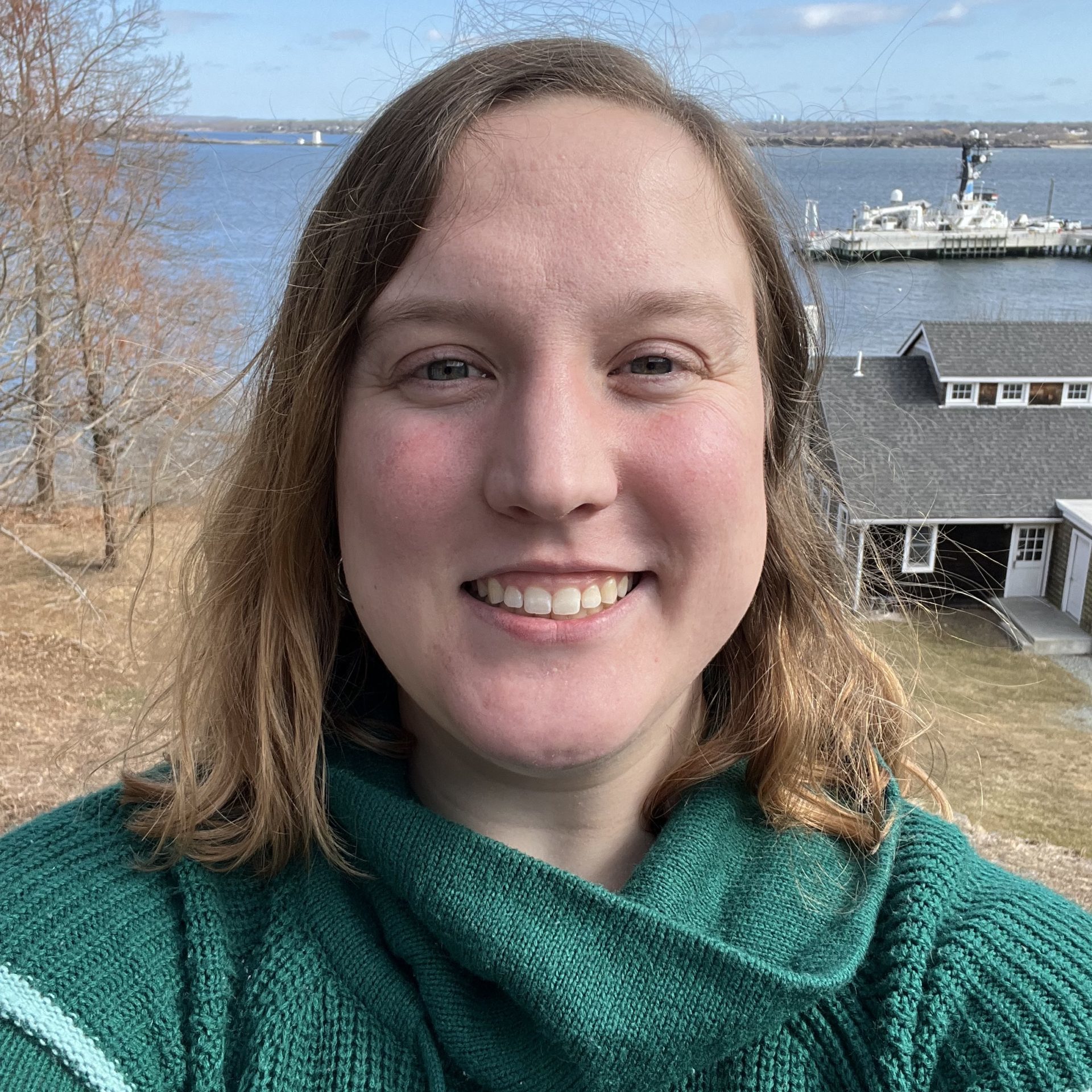
Allie Pouliot
NOAA Digital Coast Fellow, Supporting ASFPM & CSO
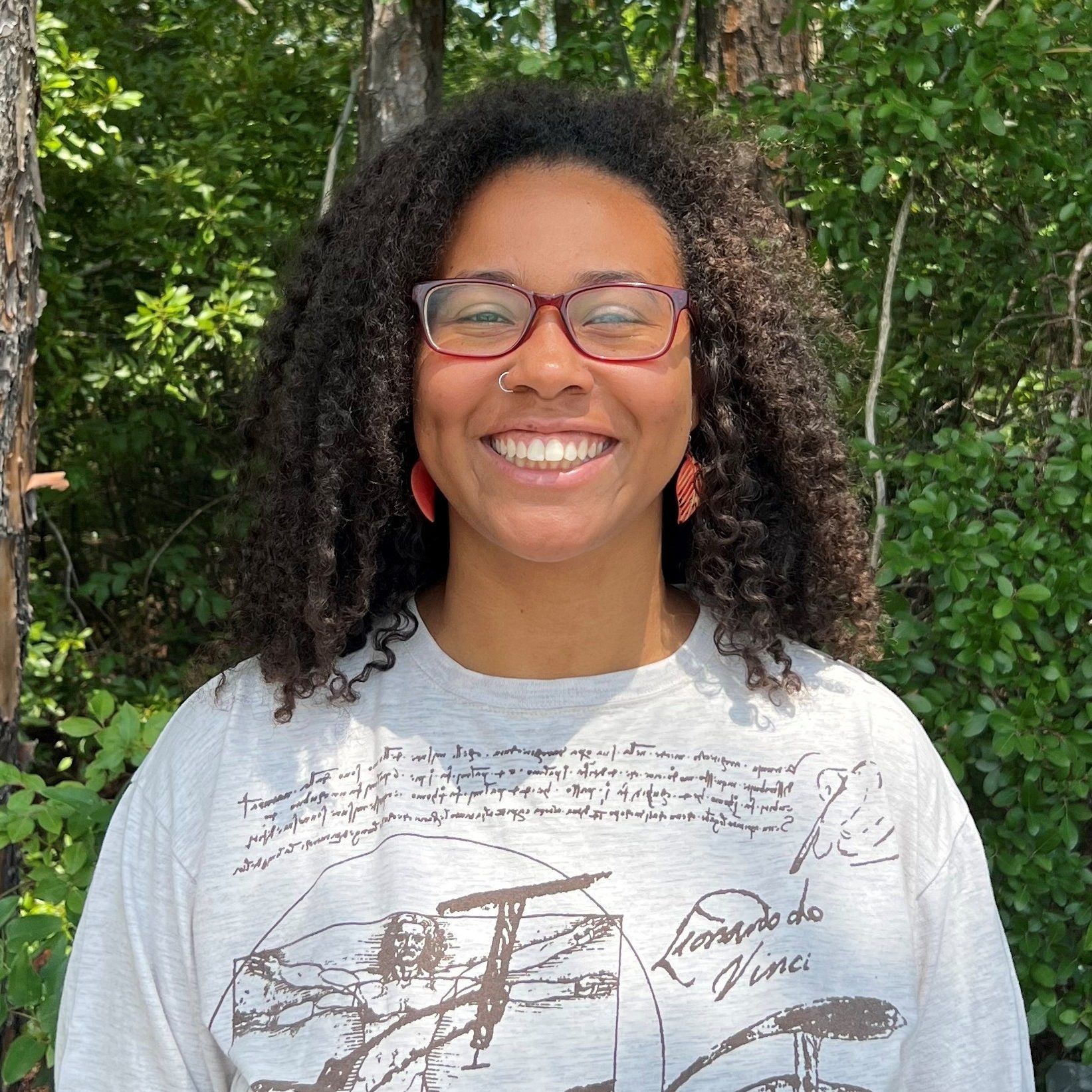
Qiyamah Williams
Community Resilience Coordinator, Mississippi State University and Mississippi Sound Estuary Program

Eleanor Rappolee
GIS Research Analyst, Flood Science Center at the Association of State Floodplain Managers

Ariam L. Torres-Cordero
Assistant Professor, Graduate School of Planning, University of Puerto Rico, Río Piedras
Special thank you for the service of past Implementation Team members:
- Henry Bell - Coastal Planner, Washington's Coastal Zone Management Program at the Department of Ecology
- Renee Collini - Director, Gulf Center for Equitable Climate Resilience at The Water Institute
- Jennifer Kline - Georgia Coastal Program
About the Coastal Inundation Community of Practice
Coastal inundation is defined as water on normally dry ground as a result of flooding in communities adjacent to oceans, major estuaries, or the Great Lakes. Coastal inundation can be caused by sea level rise, storm surge, wind, waves, high tide flooding, heavy precipitation, and/or lake level change, among other physical processes, and can have temporary and permanent flooding impacts.
Coastal resilience is the ability of populations, ecosystems, and economies to prepare for, absorb, respond to, recover from, and successfully adapt to the impacts of natural and human-caused hazards, such as hurricanes and oil spills, and long-term environmental change, such as habitat loss and sea level rise.
A Community of Practice (CoP) is a group of professionals, informally bound to one another through the common pursuit of solutions through shared interests. Communities of Practice are a way of developing social capital, nurturing new knowledge, stimulating innovation, and learning from one another.
All practitioners addressing current and future coastal flooding in the U.S. states and territories are welcome to join the Coastal Inundation Community of Practice. State and local government staff, consultants, engagement professionals, resilience coordinators, and others may find value in participating.
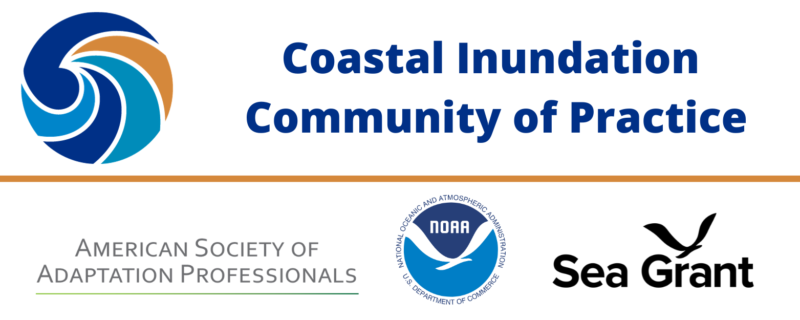
Funding is made possible by Infrastructure Investment and Jobs Act (IIJA), a historic, federal government-wide investment that is advancing NOAA's efforts to build Climate-Ready Coasts.

